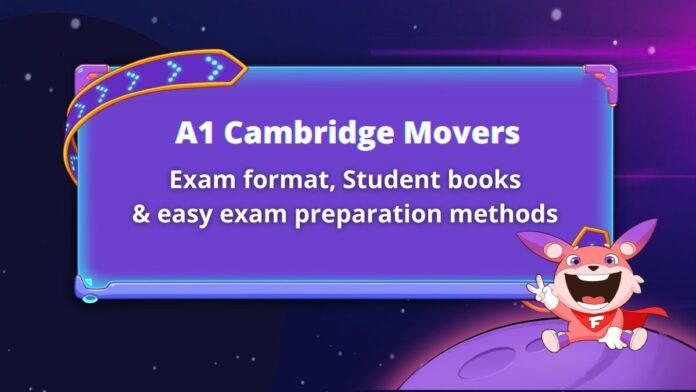A1 Cambridge Movers is the second level in the Cambridge Young Learners English (YLE) program, consisting of three levels administered by the English Language Assessment Board of the University of Cambridge. The A1 Movers exam is designed for children aged 8 to 10.
1. Introduction to the A1 Cambridge Movers exam
Pre A1 Starters, A1 Movers, and A2 Flyers are three levels within the Cambridge English Young Learners (YLE) program for children aged 6 to 11. A1 Movers is the second level in this English program.
The A1 Movers exam provides young learners with the opportunity to become familiar with English in everyday situations. With familiar topics and a focus on the skills of Listening, Speaking, Reading, and Writing, A1 Movers helps children develop effective English communication skills. The maximum score for this exam is 15 shields (Cambridge logo), and the A1 Movers Cambridge certificate has lifelong validity.
2. A1 Cambridge Movers Format
The A1 Movers exam consists of three separate sections: Listening, Reading & Writing, and Speaking. The total test duration is approximately 1 hour. Here is the specific breakdown:
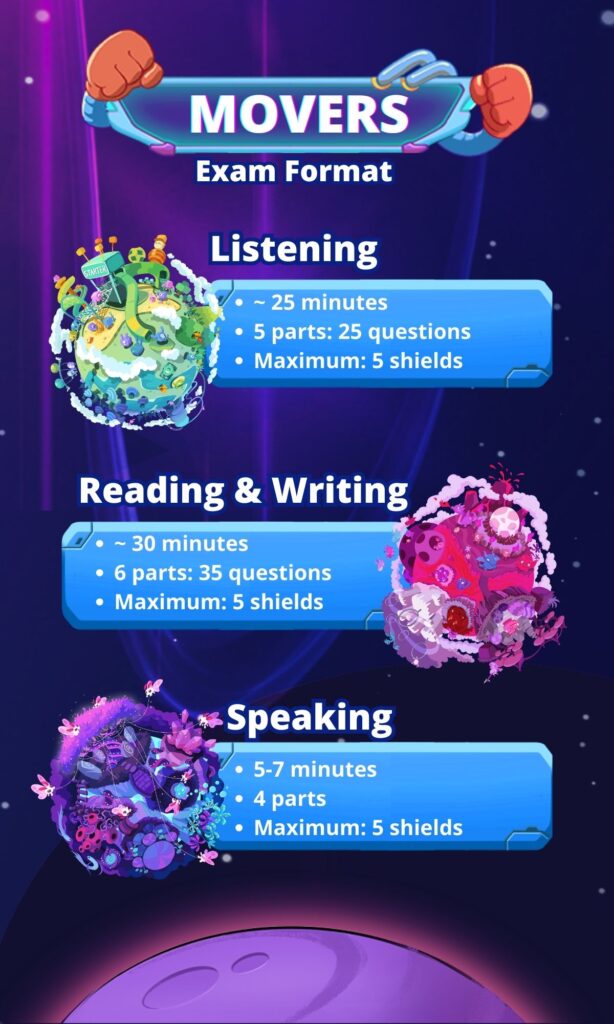
2.1. Listening test
| Duration | 25 minutes |
| Number of parts | 5 sections/25 questions |
| Maximum score | 5 shields |
| Part | Task Description | Strategies | Necessary skills |
|---|---|---|---|
| Part 1 | Look at a picture describing people engaged in various activities. The names of the characters are provided. The candidates listen to a conversation and match the names to the correct person in the picture. | – Practice distinguishing between names in the vocabulary list, whether they are male or female. – Pay attention to all the information in the dialogue about a specific person to choose the correct person mentioned. | Listening to names and descriptions |
| Part 2 | Listen to a dialogue and fill in the missing information (write numbers or letters) | – Review vocabulary words from Pre A1 Starters and A1 Movers. – Practice spelling skills, as there might be a question requiring spelling. – There are also questions requiring number filling, so practice reading numbers from 0 to 100. | Listening to names, spelling, and other details. |
| Part 3 | This section includes a page with pictures A, B, C, D, E, F, G, and H; the other page contains the names of people/objects/places and empty boxes. Candidates listen to a dialogue and write the letter of the picture in the empty box next to the corresponding person/object/place. | – Read the introduction question before playing the audio to understand the content and characters in the dialogue. – The order of the images on both pages is random. | Listening to words, names, and specific information |
| Part 4 | Listen to 5 separate dialogues. Each dialogue has a multiple-choice question with 3 options represented by 3 pictures. Mark the correct picture. | – Listen to the entire dialogue before deciding on the answer, as the images are all referred to in the audio. – This section usually contains a lot of vocabulary words, so familiarize yourself with all the words in the Pre A1 Starters and A1 Movers vocabulary list. | Listening to specific information in various forms. |
| Part 5 | View a grayscale picture. The candidate’s task is to listen to a dialogue and follow the instructions (color or fill in words). | – The test does not require a beautiful drawing; candidates just need to understand the instructions and do them accurately. – The words to be written are not difficult and usually have a meaning that matches the picture. – Practice listening to phrases and prepositions describing positions. | Listening to words, colors, and specific information. |
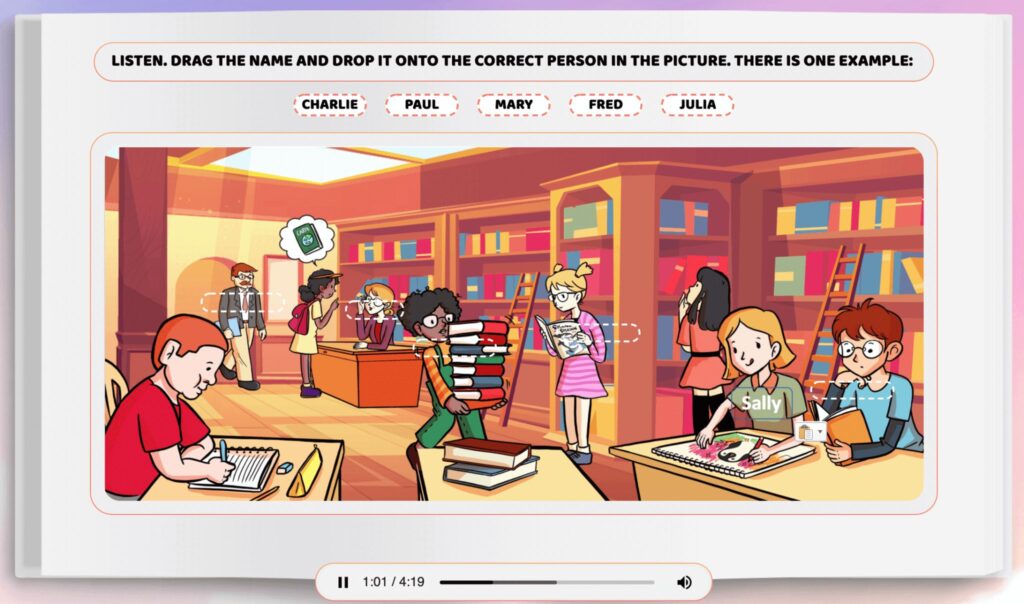
2.2. Reading & Writing test
| Duration | 30 minutes |
| Number of parts | 6 sections/35 questions |
| Maximum score | 5 shields |
| Part | Task Description | Strategies | Necessary skills |
|---|---|---|---|
| Part 1 | There are 8 pictures, each accompanied by a word illustrating it written below. Candidates write the word for each picture next to its definition. One example is given. | Practice reading and writing the definitions of words in the Pre A1 Starters and A1 Movers vocabulary lists. | Matching words to their corresponding definitions. |
| Part 2 | Read a dialogue and choose the response of the listener by circling A, B, or C | – Read all the answers before selecting the most accurate and appropriate one. The dialogue includes not only questions and responses but also suitable affirmations or responses. – Practice with “Yes” or “No” responses. | Selecting the correct response. |
| Part 3 | Read a text with some blanks and view pictures with words describing the content of the picture. Candidates choose suitable words to fill in the blanks. Finally, there’s a multiple-choice question with 3 answer choices to select the text’s title | – Read the entire text to understand the main content and choose the correct words. – Practice by guessing which word can fill in the blank without looking at the given words. – Practice selecting appropriate word forms (singular/plural nouns, adjectives, verbs) | Reading comprehension of specific information and the main idea of the text. Accurate copying of words |
| Part 4 | Read a text with some blanks. Each blank has 3 answer options. Candidates choose the correct answer and write the word to fill in the blank | – Practice selecting the word type for each word. – Read the sentences around the blank to choose the correct word. | Reading comprehension of factual information in the text and the candidate’s knowledge of grammar and vocabulary. Accurate copying of words |
| Part 5 | Read a story consisting of 3 parts. Each part has an illustrated picture. Candidates complete the sentence with 1-3 appropriate words. | – Practice predicting the story’s outline from the three images and titles, summarizing the text. – Answers are always found in the text. – Review synonyms, pronouns, etc. | Reading comprehension of the story and completing sentences. |
| Part 6 | Look at a picture, complete a sentence, and answer questions (in full) about the picture’s content. | – For questions 1 and 2, write a short word or phrase. For questions 3, 4, 5, and 6, write longer answers. – Write different sentences for questions 5 and 6. | Completing sentences, answering questions, and writing sentences about the given picture. |
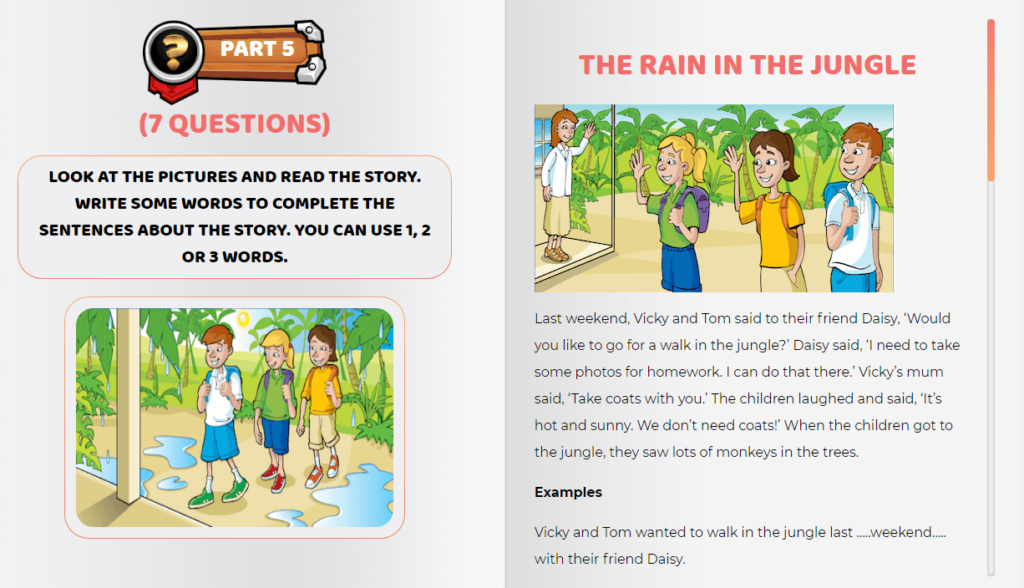
2.3. Speaking test
| Duration | 5-7 minutes |
| Number of parts | 4 sections |
| Maximum score | 5 shields |
| Part | Task Description | Necessary skills |
|---|---|---|
| Part 1 | Find the differences between two images (objects, colors, numbers, positions, actions, etc.). – The examiner greets the candidate and asks their name and age. – The examiner describes the task requirements and shows the candidate 2 similar pictures with a few differences. The examiner suggests that the candidate identifies and describes 4 differences. | Describe the differences between the two pictures, including aspects such as colors, sizes, numbers, positions, appearances, and actions of people in the pictures |
| Part 2 | Tell a story based on given pictures. – The examiner shows the candidate a series of 4 pictures that, when arranged correctly, tell a story. – The examiner describes the first picture to the candidate and then suggests the candidate describe the other 3 pictures. The story title and the main character’s name are provided. | Understand how to start a story and develop the story’s content, describing the pictures. |
| Part 3 | Find one different picture and explain why.The examiner shows the candidate 4 sets of pictures, each containing 4 pictures. In one set, there are 3 pictures of the same type and one “odd one out.” The candidate must determine which picture is the “odd one out” and explain the reason why. | Identify the picture that is different from the others and provide an explanation |
| Part 4 | Answer personal questions about topics such as school, weekend activities, friends, and hobbies | Understand and answer questions about personal information |
In addition, students can also refer to the Movers Speaking practice series offered by the FLYER virtual test center (5 episodes).
3. How is A1 Movers scored?
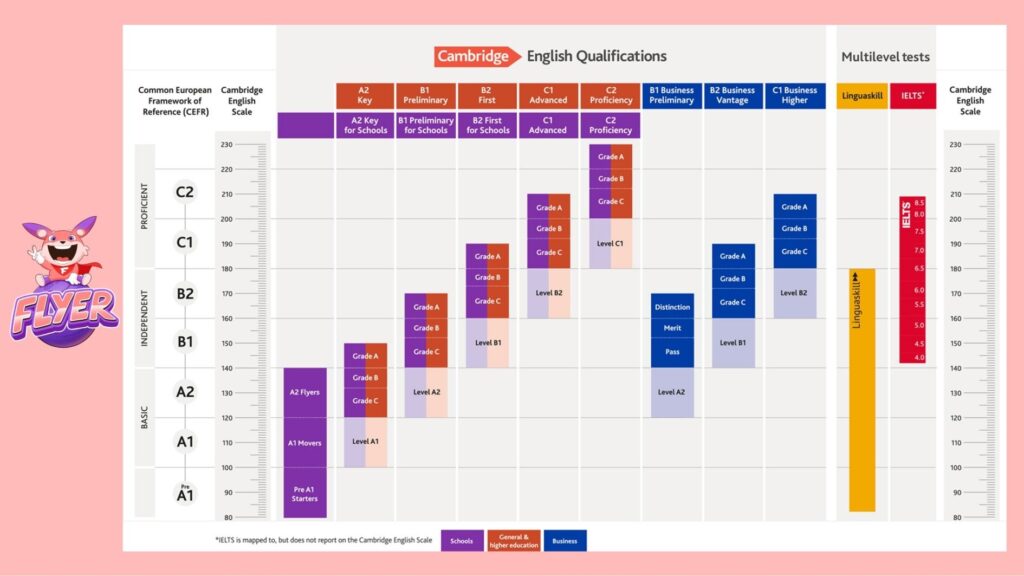
All candidates participating will receive a certificate without assessment of whether they pass or fail. The certificate will display a shield symbol that the student has earned. The shield is taken from the emblems of the royal knights and later became the logo of Cambridge, similar to a symbol of victory. The maximum number of shields for each skill – Listening, Speaking, Reading & Writing, is 5 shields.
At the skill level:
| Achieving 1 shield | Students need to further develop that skill |
| Achieving a maximum of 5 shields | Students performed very well in that test section and answered most questions correctly. |
At the comprehensive test level:
| Achieving under 6 shields | Students need to practice diligently and further improve their skills. |
| Achieving from 7 to 9 shields | Students’ skills are quite good and need further improvement. |
| Achieving from 10 to 14 shields | Students are excellent and capable enough to proceed to the next level. |
| Achieving a maximum of 15 shields | Students are considered outstanding and have the ability to advance to the next level |
4. Latest format of Movers exams
4.1. Practice Movers tests
For practice, there are official Cambridge English practice tests available. These practice tests come with audio materials, transcripts, and detailed answer keys. They offer an engaging and colorful format to familiarize children with the test structure.
4.2. 200+ practice Movers tests on the FLYER Virtual English Testing Platform
The FLYER Virtual English Testing Platform offers 200+ Cambridge Movers exam practice tests (covering all parts: Listening, Reading & Writing, and Speaking) to provide your child with preparation for the Cambridge Starters exam.
- These exams have been carefully compiled to match the format (up to 90%) following Cambridge’s latest standards.
- The automatic scoring system and answer key will help students review and study effectively at home.
- Interactive exercises and game simulations stimulate children’s brain activity and interest in learning.
- It offers various fun learning features such as challenges with friends, short practice exercises, and vocabulary reviews.
Moreover, a helpful feature for parents is the Learning Report, which makes it easy to track the progress of their children’s studies. The system automatically stores all test results and uses them to provide feedback on the student’s current proficiency level, strengths, and areas that require improvement.
More significantly, parents who use FLYER’s virtual testing platform can save up to 80% on their kids’ exam preparation expenses!
Conclusion
Through this article, parents and children now have a clear understanding off the structure of the Movers exam. With the high-quality Movers exam preparation foundation provided by FLYER Virtual Exam Room, hope thay children can achieve the best results in the upcoming Flyers exam day.
You may also like


